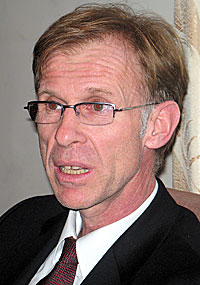 Nepali Times: How did your meeting with King Gyanendra go?
Nepali Times: How did your meeting with King Gyanendra go? Reto Meister: His Majesty expressed Nepal's commitment to respect the Geneva Conventions. The audience with His Majesty allowed us to inform him about the working relationship that we maintain with different ministries. He also paid attention to the information made to him regarding our specific functions and cooperation with the Royal Nepali Army. He expressed his commitment to the issues we had brought to his attention.
You also met with other senior state officials.
Yes, we also had a meeting with the minister for home affairs during which we expressed our satisfaction regarding the cooperation for granting access to the people in detention, arrested and detained after 1 February. We had a closed-door meeting with the chief of army staff that allowed frank discussion on the state of our cooperation, in particular the question of the protection of the persons under control of armed forces and the modality as according to which the ICRC can visit. ICRC made concrete and constructive proposals on how to evaluate this aspect of our particular work with the RNA.
We were briefed on the situation prevailing as far as conflict is concerned and we also received a detailed briefing on what the Human Rights Cell had undertaken over the last two years. Regarding the activities of the Cell, we were apprised of the training of commanding officers and soldiers to know what the rules are. We also learnt that the RNA wishes to respect impunity and to prosecute persons in their ranks that do not respect the Geneva Conventions.
What policy does ICRC have regarding its support to internally displaced persons?
The ICRC has a mandate to protect the victims of armed conflict. Giving materials and health assistance are some of the major activities of our institution. Other than the protection of civilians and prisoners, IDP support is one of our key operations in the field.
Recently, a senior government official said there is no need for international human rights monitoring. Your response?
The first responsibility to apply international law lies with the signatory state. If the state demonstrates that it can apply international law, then indeed there is no need for an international observer. Again we would abstain ourselves to pronounce whether or not what the government representative has said corresponds to what I have just said. It is not for us to comment whether or not Nepal specially needs UN human rights representative. We would definitely abstain from taking any position on this.
What is the major challenge for humanitarian work in a conflict situation?
For ICRC, the major challenge is to have an impact on the lives of the civilian population and the persons that do not participate in the hostilities as far as their protection is concerned, that they are not exposed to abuse and do not disappear.
How do the state and rebels view your presence in Nepal?
You take as an example the question of the security of our personnel. We are pleased to say that we are able to work safely. We don't have the kind of security threat that would indicate that we are not accepted. On the contrary we have good dialogue and assurances that contributions made by ICRC are welcome.


